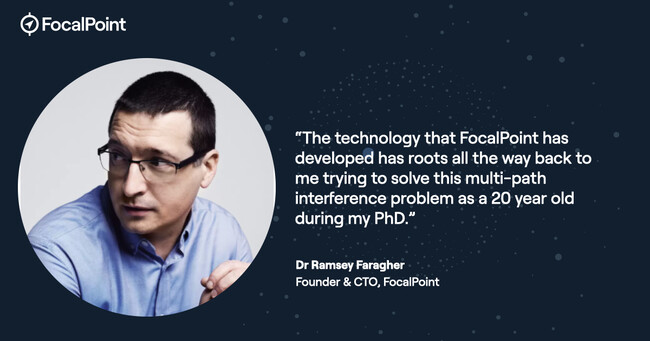Making GPS better
Ramya Sriram
3 min read
10th Apr, 2023
S-GNSS

Founder & CTO, Dr Ramsey Faragher has been on a mission to make GPS better since 2015. Reflecting on his startup journey in a tech region known for its thriving entrepreneurial ecosystem, he talks to Cambridge Technology Podcast hosts Faye Holland and James Parton about all things technology, from the heart of the UK's tech capital.
Studying Physics as an undergraduate and completing his PhD, he has lived in Cambridge for a number of years, launching FocalPoint in 2015. Known for its World-Class University and soaring tech investment, Cambridge has become a thriving startup ecosystem. According to TechNation, FocalPoint is 1 of 353 start-ups in a region of 15% high growth firms, creating 30,000 digital jobs.
Having a core hub in Cambridge as a growing business gives FocalPoint access to super-talented individuals, as well as a rich community of successful and established “Silicon Fen” entrepreneurs who can provide invaluable guidance along the way.
In this interview, Ramsey discusses his inspirational journey to where the company is today. “Today we’re a B2B enterprise, and we license our IP. From the very beginning, it was always going to be about IP and protecting that well. And in the GPS world, it has often been the case that some of the most important changes and innovations have been basically a very clever idea that’s been patented, and then made its way into standards or otherwise established itself as a universal technology”.
After a stint in the defence sector, Ramsey came back to academia. It was during this time that he learnt how the chips in mobile phones are designed. This was the moment that the idea for FocalPoint was born.
”I learned about the real problems that the devices had and the stars all started to align for me in terms of seeing that I could actually change how the chips inside the phones work in order to solve some big problems. The technology that FocalPoint has developed has roots all the way back to me trying to solve this multipath interference problem as a 20 year old during my PhD. Solving the problem had turned into my life’s work and it was almost accidental in some ways that I found myself running a company that is making GPS better. I never planned to do that from the beginning, I always assumed I would be an academic when I was younger, but it just shows how the sequence of events you can go on can evolve dramatically through your career”.

On explaining his Supercorrelation invention, Ramsey offers this interesting comparison to military grade receivers.
“Our improvement is a software change that can go inside the chip and improve the performance way beyond any changes to the signal structure can. It’s actually the equivalent of putting a $10,000 military-only controlled-radiation-pattern antenna which is the size of a dinner plate, on your smartphone or on your car. These things are military receivers that do the same things that our software can. They can determine the angle of arrival. So they keep the good signals and they throw away the garbage and they ignore spoofers. They ignore illegal broadcasts or fake data. So your choice is: either be a military entity who’s allowed to buy those things, or licence our technology, tweak the software and get the same performance benefits with a bit of clever code in the commercial sector.”
“Being inside every single GPS chip on the planet, through an IP play is very unusual, but very powerful and will be hugely, hugely profitable.”
Offering insight into the future, Ramsey concludes, “the biggest piece of research that we’ve got going on right now inside FocalPoint is that we’re going to try and get centimetre level accuracy on smartphones using our technology, which will be a very big step up from the performance you get today”.
You can listen to Ramsey’s interview as part of the Cambridge Technology podcast above, or via their website here.
Image of Ramsey / Source Wired magazine / Shamil Tanna







